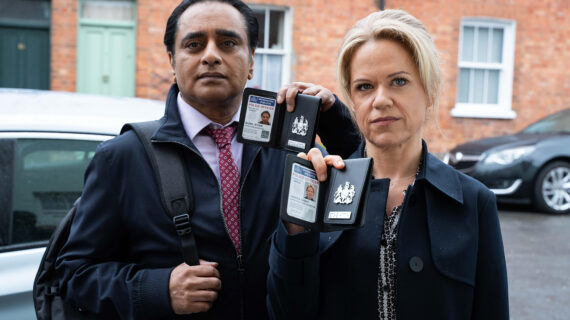Frederica Freyberg:
A first look tonight at the governor’s proposals regarding marijuana. Under the plan, which Evers says he will include in his budget, medical marijuana would be legalized in Wisconsin with a doctor’s recommendation and a state-issued ID card. Dispensaries of medical marijuana would be licensed by the state, with specific rules covering quality and location of where it could be sold, like not within 500 feet of a school. Additionally, people licensed to consume medical marijuana could grow up to 12 plants of their own and possess up to three ounces. There would be restrictions for operating a motor vehicle or heavy machinery and smoking marijuana would not be allowed in public places like a bus, school, park or youth center. The proposal would also allow possession of CBD oil without a physician’s certificate and it would decriminalize the possession, manufacture or distribution of marijuana for amounts of 25 grams or less. The plan would also establish an expungement procedure for people convicted for less than 25 grams who have completed their sentence.
So Wisconsin is looking at legalizing medical and decriminalizing recreational marijuana. Other states have already gone down this road. For example, Michigan, which legalized medical marijuana ten years ago and recreational just last year. To get a sense of how it’s working out in that state we go now to David Harns with the Michigan Department of Licensing and Regulatory Affairs. He joins us from Lansing. Thanks very much for being here.
David Harns:
Glad to be here.
Frederica Freyberg:
Overall, how would you describe Michigans journey toward legalization?
David Harns:
Well, it’s been — the medical side, like you mentioned, has been in place. It was voted on over ten years ago. And so the medical side has been going ups and downs, here and there over the last decade. But it’s really kind of came into its own in 2016, when the legislature put into place the Facilities Licensing Act. And so that really put some framework around the medical side, which was kind of — it wasn’t really organized as well as it is now in the first few years that it existed.
Frederica Freyberg:
So that took a while. But the legalization of recreational marijuana in Michigan is now on the books. But is it still true under this fledgling law that you can’t buy it or sell it?
David Harns:
Well, so you will be able to buy it and sell it, but the licensing process is still underway. And so we face a deadline of December of 2019 in order to have business applications available so that businesses can set up shop and sell the — adult use is what we call it here, adult use marijuana. The medicinal stuff is for sale right now and we expect that they will kind of come together at some point.
Frederica Freyberg:
So at this point, before it kind of comes together in that way, how does someone who wants to possess the adult possession of marijuana get it?
David Harns:
Sure. So you’re allowed — basically you’re allowed to possess it yourself. You can grow it yourself. And you can gift it to your friends. You can hand it to somebody else. But there is no process right now for selling it.
Frederica Freyberg:
How complicated is it to roll out this new law?
David Harns:
Well, it’s complicated in the fact that it’s a piece of legislation that was written by the voters, really, and passed by the voters. And so there are, you know, holes that need to be filled in with administrative rules and there are things that need to be looked at because they don’t necessarily, you know, work with the things that currently are in place. And so you just have to take a look at the law as it was written and as it was passed and you have to just basically just figure out how to make it work the best. And that’s why we’re talking to stakeholders and we’re talking to those in the industry and we’re getting their input over the next several months while we’re beginning the rule-writing process.
Frederica Freyberg:
In terms of the adult use in Michigan, who is it that needs licensing?
David Harns:
So the way it is right now is the medical facilities have already gone through the process and we have over 100 licenses in place right now. We just had a board meeting yesterday where another 17 were doled out. That process started in December of 2017. Really got ramped up last summer. So all of the medical facilities that have applied and are now starting to get their licenses are now able to sell that product to cardholders here in Michigan. You have to be registered with the state and have a card. Those folks can buy it today if they go into a medical shop. But on the adult use side, all of the licensed shops will need to be — or all of the shops that are selling product in the future will need to be licensed by the state of Michigan.
Frederica Freyberg:
Now, marijuana is taxed. What are the projections for tax revenue I guess from both kinds of use?
David Harns:
Well, those numbers vary and it depends on how quickly things are going to get off the ground. But they do expect it to have a significant impact moving forward once the entire framework is put in place and everybody gets their businesses up and running. But it starts slowly for sure.
Frederica Freyberg:
On the medical marijuana, has there been any kind of decline in the use or abuse of opioids because people now are using marijuana for pain, for example?
David Harns:
Well, that’s kind of out of my wheelhouse, but there are anecdotal evidence. There is anecdotal stories that say that that is the case. We’re here to just implement the law as it was written. And I think that a lot of the people who voted for it did so because of that very reason.
Frederica Freyberg:
And this question. Not sure if this is in your wheelhouse either. But for either type of use, medical or recreational, I understand there is zero tolerance legally for driving under the influence of marijuana. Has the state seen an uptick in DUIs because of these laws then?
David Harns:
Just in following media reports, I would say that there’s been a little bit here and a little bit there, but nothing dramatically. Again, that’s not necessarily our purview here at the Department of Licensing and Regulatory Affairs. That’d be more of the state police or the local police but I do kind of pay attention to the media and I kind of watch for stories around this topic and there hasn’t been a big uptick that Ive seen in the media anyway.
Frederica Freyberg:
All right. Well, David Harns, thanks very much for your information out of Michigan.
David Harns:
For sure. Thank you.
Search Episodes
Related Stories from PBS Wisconsin's Blog

Donate to sign up. Activate and sign in to Passport. It's that easy to help PBS Wisconsin serve your community through media that educates, inspires, and entertains.
Make your membership gift today
Only for new users: Activate Passport using your code or email address
Already a member?
Look up my account
Need some help? Go to FAQ or visit PBS Passport Help
Need help accessing PBS Wisconsin anywhere?

Online Access | Platform & Device Access | Cable or Satellite Access | Over-The-Air Access
Visit Access Guide
Need help accessing PBS Wisconsin anywhere?

Visit Our
Live TV Access Guide
Online AccessPlatform & Device Access
Cable or Satellite Access
Over-The-Air Access
Visit Access Guide
 Passport
Passport

















Follow Us